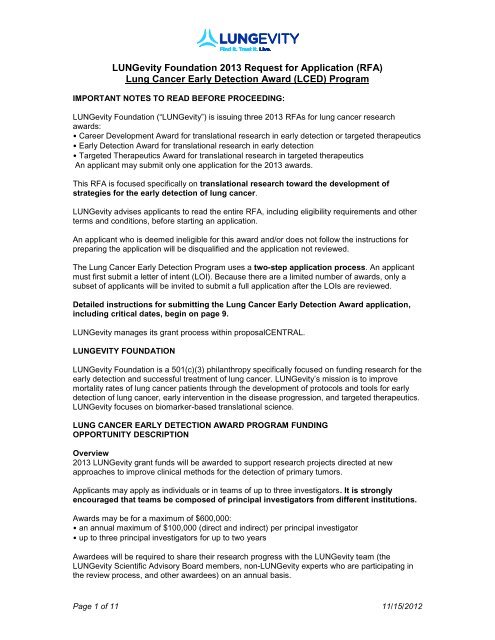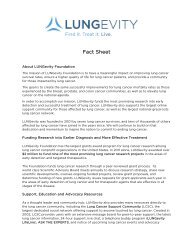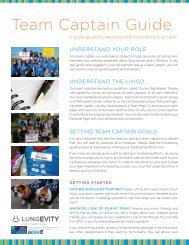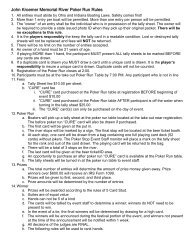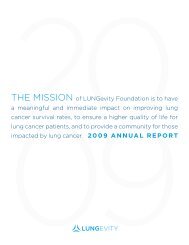RFA Lung Cancer Early Detection Award - LUNGevity Foundation
RFA Lung Cancer Early Detection Award - LUNGevity Foundation
RFA Lung Cancer Early Detection Award - LUNGevity Foundation
You also want an ePaper? Increase the reach of your titles
YUMPU automatically turns print PDFs into web optimized ePapers that Google loves.
<strong>LUNGevity</strong> <strong>Foundation</strong> 2013 Request for Application (<strong>RFA</strong>)<br />
<strong>Lung</strong> <strong>Cancer</strong> <strong>Early</strong> <strong>Detection</strong> <strong>Award</strong> (LCED) Program<br />
IMPORTANT NOTES TO READ BEFORE PROCEEDING:<br />
<strong>LUNGevity</strong> <strong>Foundation</strong> (“<strong>LUNGevity</strong>”) is issuing three 2013 <strong>RFA</strong>s for lung cancer research<br />
awards:<br />
• Career Development <strong>Award</strong> for translational research in early detection or targeted therapeutics<br />
• <strong>Early</strong> <strong>Detection</strong> <strong>Award</strong> for translational research in early detection<br />
• Targeted Therapeutics <strong>Award</strong> for translational research in targeted therapeutics<br />
An applicant may submit only one application for the 2013 awards.<br />
This <strong>RFA</strong> is focused specifically on translational research toward the development of<br />
strategies for the early detection of lung cancer.<br />
<strong>LUNGevity</strong> advises applicants to read the entire <strong>RFA</strong>, including eligibility requirements and other<br />
terms and conditions, before starting an application.<br />
An applicant who is deemed ineligible for this award and/or does not follow the instructions for<br />
preparing the application will be disqualified and the application not reviewed.<br />
The <strong>Lung</strong> <strong>Cancer</strong> <strong>Early</strong> <strong>Detection</strong> Program uses a two-step application process. An applicant<br />
must first submit a letter of intent (LOI). Because there are a limited number of awards, only a<br />
subset of applicants will be invited to submit a full application after the LOIs are reviewed.<br />
Detailed instructions for submitting the <strong>Lung</strong> <strong>Cancer</strong> <strong>Early</strong> <strong>Detection</strong> <strong>Award</strong> application,<br />
including critical dates, begin on page 9.<br />
<strong>LUNGevity</strong> manages its grant process within proposalCENTRAL.<br />
LUNGEVITY FOUNDATION<br />
<strong>LUNGevity</strong> <strong>Foundation</strong> is a 501(c)(3) philanthropy specifically focused on funding research for the<br />
early detection and successful treatment of lung cancer. <strong>LUNGevity</strong>’s mission is to improve<br />
mortality rates of lung cancer patients through the development of protocols and tools for early<br />
detection of lung cancer, early intervention in the disease progression, and targeted therapeutics.<br />
<strong>LUNGevity</strong> focuses on biomarker-based translational science.<br />
LUNG CANCER EARLY DETECTION AWARD PROGRAM FUNDING<br />
OPPORTUNITY DESCRIPTION<br />
Overview<br />
2013 <strong>LUNGevity</strong> grant funds will be awarded to support research projects directed at new<br />
approaches to improve clinical methods for the detection of primary tumors.<br />
Applicants may apply as individuals or in teams of up to three investigators. It is strongly<br />
encouraged that teams be composed of principal investigators from different institutions.<br />
<strong>Award</strong>s may be for a maximum of $600,000:<br />
• an annual maximum of $100,000 (direct and indirect) per principal investigator<br />
• up to three principal investigators for up to two years<br />
<strong>Award</strong>ees will be required to share their research progress with the <strong>LUNGevity</strong> team (the<br />
<strong>LUNGevity</strong> Scientific Advisory Board members, non-<strong>LUNGevity</strong> experts who are participating in<br />
the review process, and other awardees) on an annual basis.<br />
Page 1 of 11 11/15/2012
<strong>LUNGevity</strong> <strong>Foundation</strong> 2013 Request for Application (<strong>RFA</strong>)<br />
<strong>Lung</strong> <strong>Cancer</strong> <strong>Early</strong> <strong>Detection</strong> <strong>Award</strong> (LCED) Program<br />
<strong>Early</strong> <strong>Detection</strong> Project Requirements<br />
Goal: Direct impact on early detection of lung cancer or a clear conceptual or experimental<br />
foundation for the future development of methods for early detection.<br />
• Preference for studies that are likely to result in patient benefit in the foreseeable future<br />
Focused on, but not limited to, one or more of the following:<br />
• Biomarker identification, discovery or validation, including combination of multiple biomarkers<br />
and assay development.<br />
- Biomarker categories include early detection, risk assessment, differential diagnostic<br />
• Imaging, including novel molecular and functional imaging strategies<br />
• Minimally invasive strategies for early detection<br />
• Identification of mechanisms leading to development of various types of lung cancer, with a<br />
plan for how to use information to identify an early detection biomarker<br />
Not the following:<br />
• Pre-clinical drug development studies, such as toxicology or library-of-compound screening<br />
• Projects focused on purely animal models or in-vitro models<br />
- Unless research has companion part of study in human specimens<br />
• Basic discovery of disease pathogenesis<br />
The use of existing resources is encouraged, including libraries of compounds or probes, tissue<br />
or bio-specimen repositories, and other existing sets of tissue, blood, or images. It is also<br />
encouraged that those applying have direct and immediate access to the bio-specimens<br />
necessary to complete the research.<br />
High-risk, high-return proposals will receive equal consideration.<br />
<strong>Award</strong> eligibility<br />
• Education and Experience: At the time of the grant term, an applicant (who must be a principal<br />
investigator for the proposed research) must hold a doctoral degree and faculty appointment<br />
with an academic institution, including research institutions that are not formally associated with<br />
a university, and have completed a training fellowship. An applicant may be at any level of<br />
research experience.<br />
An applicant must be an independent, self-directed researcher for whom his/her institution must<br />
provide space and other resources customary for independent investigators. The application<br />
must convey the commitment of the institution to the applicant and the proposed research<br />
activities.<br />
• Citizenship: At the time of application, an applicant must be a United States citizen or a foreign<br />
national holding one of the following visa immigration statuses: permanent resident (Green<br />
Card), exchange visitor (J-1), temporary worker in a specialty occupation (H-1, H-1B), Canadian<br />
or Mexican citizen engaging in professional activities (TC or TN), or temporary worker with<br />
extraordinary abilities in the sciences (O-1). A non-citizen must submit a notarized copy of proof<br />
of possession of a Green Card or J-1, H-1, H-1B, TC, TN or O-1 visas. At the time of application<br />
and throughout the duration of the award, an applicant/awardee must be employed by a U.S.<br />
institution.<br />
Page 2 of 11 11/15/2012
<strong>LUNGevity</strong> <strong>Foundation</strong> 2013 Request for Application (<strong>RFA</strong>)<br />
<strong>Lung</strong> <strong>Cancer</strong> <strong>Early</strong> <strong>Detection</strong> <strong>Award</strong> (LCED) Program<br />
<strong>Award</strong> information<br />
• <strong>Award</strong> Structure and Allocation: <strong>LUNGevity</strong> <strong>Early</strong> <strong>Detection</strong> <strong>Award</strong>s may be for a maximum of<br />
$100,000 (direct and indirect) per year per principal investigator (up to three principal<br />
investigators) for two years. In other words, the total amount awarded over a two-year period<br />
may range from a maximum of $200,000 for a project with a single principal investigator to a<br />
maximum of $600,000 for a project with three principal investigators.<br />
No more than 25% of the requested budget may be used for an awardee’s salary and/or fringe<br />
benefits, no more than 30% of the total award budget may go to fund the purchase of permanent<br />
equipment, and no more than 15% of the total award budget may be used for overhead/indirect<br />
costs.<br />
<strong>Award</strong> funds may be used for the salary and fringe benefit costs of personnel other than the<br />
applicant. Fringe benefit costs may only be expended upon the stipulation that they not be<br />
obtained from another source.<br />
• Duration: <strong>LUNGevity</strong> <strong>Early</strong> <strong>Detection</strong> <strong>Award</strong>s are subject to annual review and may be granted<br />
for up to two years.<br />
Factors considered in evaluating applications<br />
Some of the factors considered when reviewing applications include:<br />
• Project’s relevance to the early detection of lung cancer<br />
• Scientific and technical merit, innovation, and feasibility of the research plan<br />
• Research environment<br />
• Qualifications of the principal investigator(s) and team<br />
• Appropriateness of the requested budget and timeline to complete the proposed research<br />
project<br />
OTHER TERMS AND CONDITIONS<br />
Following are the other terms and conditions that apply to the <strong>LUNGevity</strong> <strong>Early</strong> <strong>Detection</strong><br />
<strong>Award</strong>s:<br />
Animal Use<br />
<strong>LUNGevity</strong> allows animal use in biomedical research only when no other means of obtaining<br />
scientifically sound, valid, and useful results are available. Applicants must ensure that only the<br />
minimum number of appropriate animals required to obtain and validate results shall be used. In<br />
cases requiring the death of an animal, only the most appropriate and humane form of euthanasia<br />
shall be used consistent with the purpose of the research.<br />
Whenever animal use is a part of a <strong>LUNGevity</strong>-funded research project, applicants must provide<br />
<strong>LUNGevity</strong> with institutional endorsements that the research facility, its research, and its<br />
employees adhere to the:<br />
• Animal Welfare Act<br />
• USDA rules<br />
• National Research Council Guide for the Care and Use of Laboratory Animals<br />
• Public Health Service Policy on Humane Care and Use of Laboratory Animals<br />
In addition, those applicants who are invited to submit a full application must include in their<br />
materials the following documents:<br />
• Association for Assessment and Accreditation of Laboratory Animal Care (AAALAC)<br />
Page 3 of 11 11/15/2012
<strong>LUNGevity</strong> <strong>Foundation</strong> 2013 Request for Application (<strong>RFA</strong>)<br />
<strong>Lung</strong> <strong>Cancer</strong> <strong>Early</strong> <strong>Detection</strong> <strong>Award</strong> (LCED) Program<br />
accreditation.<br />
• Institutional Animal Care and Use of Committee (IACUC) approval.<br />
A researcher is not eligible to apply if the research proposal involves animals and the institution<br />
does not have accreditation from the Association for Assessment and Accreditation of Laboratory<br />
Animal Care International (AAALAC), or does not hold a current Public Health Service (PHS)<br />
Animal Welfare Assurance, or does not have accreditation from the United States Department of<br />
Agriculture, or does not have accreditation from the Institutional Animal Care and Use Committee<br />
(IACUC).<br />
Annual Meetings<br />
<strong>LUNGevity</strong> hosts two annual Scientific Advisory Board meetings, one in the spring and one in the<br />
fall. <strong>Award</strong>ees are required to attend both meetings.<br />
Authorized <strong>Award</strong> Holders<br />
<strong>LUNGevity</strong> grants research awards only to individuals; awards are not awarded to institutions. No<br />
award may be held by or transferred to another individual.<br />
<strong>Award</strong> Payment Schedule<br />
<strong>LUNGevity</strong> will issue the first-year award payment in Summer 2013. Assuming award renewal,<br />
<strong>LUNGevity</strong> will issue the second-year award payment in Summer 2014.<br />
Biohazards<br />
Biohazards are broadly defined to be recombinant and/or infectious and tumor materials that may<br />
be deleterious to normal organisms upon controlled exposure. Research involving biohazards<br />
requires one paper copy of the appropriate institutional committee approval at the time a full<br />
application is submitted.<br />
Carryover or Extensions<br />
Requests for carryover or award extensions require prior approval by <strong>LUNGevity</strong>. All requests<br />
must be in writing. The written requests for carryover and/or extensions must be received by<br />
<strong>LUNGevity</strong> 30 days prior to the award’s official termination date. When requesting a carryover,<br />
the awardee must indicate the amount and from what budget-line and to what budget-line the<br />
monies are being applied. In the case of supplies or equipment, all items must be itemized.<br />
<strong>Award</strong>ees may only request a carryover or extension once per award.<br />
Change in Budget<br />
Requests for changes in budget require prior approval by <strong>LUNGevity</strong>. All requests must be in<br />
writing. When requesting a change in budget, the awardee must indicate the amount of the<br />
change and from what budget-line and to what budget-line the monies are being transferred. In<br />
the case of supplies or equipment, all items must be itemized.<br />
Change of Institution<br />
Transfer of a <strong>LUNGevity</strong> award from one institution to another requires prior approval by<br />
<strong>LUNGevity</strong>. All requests must be in writing. All unexpended funds must be returned to <strong>LUNGevity</strong><br />
within 45 days of transfer approval. Once <strong>LUNGevity</strong> receives the unexpended funds, they will be<br />
reissued to the new institution.<br />
Equal Employment Opportunity<br />
<strong>LUNGevity</strong> awards will be awarded to individuals working in institutions identified as Equal<br />
Opportunity Employers.<br />
Page 4 of 11 11/15/2012
<strong>LUNGevity</strong> <strong>Foundation</strong> 2013 Request for Application (<strong>RFA</strong>)<br />
<strong>Lung</strong> <strong>Cancer</strong> <strong>Early</strong> <strong>Detection</strong> <strong>Award</strong> (LCED) Program<br />
Equipment and Supply Purchases<br />
Upon conclusion of the award, equipment and supplies purchased with award funds become the<br />
property of the institution at which the work was done. Any departure from this requires prior<br />
written approval from <strong>LUNGevity</strong>.<br />
Equipment Expenditures<br />
No more than 30% of the total award budget may go to fund the purchase of permanent<br />
equipment. Equipment is defined as an item that costs $500 or more, has a primary function<br />
related to the research project, and ordinarily has a usable life expectancy of one year or greater.<br />
Equipment Repair & Service Contracts<br />
No award shall be used for repair or service contract costs for institutional equipment.<br />
Financial Report<br />
At the conclusion of the award period, <strong>LUNGevity</strong> requires a complete financial disbursement<br />
report covering the entire award period. The disbursement report must reflect the award<br />
expenditures as approved by <strong>LUNGevity</strong>. Any funds used for unauthorized expenditures or<br />
unexpended funds must be returned to <strong>LUNGevity</strong>, with the disbursement report, within 45 days<br />
of the award termination date.<br />
Human Subjects<br />
Whenever human subjects are a part of a <strong>LUNGevity</strong>-funded research project, the following<br />
documents must be received before any award monies are released:<br />
• A copy of the Institutional Review Board (IRB) approval and approved patient consent forms.<br />
<strong>LUNGevity</strong> encourages applicants to submit their projects to the appropriate human subjects<br />
Institutional Review Board at the time of application.<br />
• A copy of the appropriate institutional committee approval for research involving human adult<br />
stem cells or use of human fetal tissue.<br />
If the proposed research project involves human subjects, the population sampled shall be<br />
inclusive of the general population of relevance to the scientific question posed, without restriction<br />
in regard to gender, race, age, and socioeconomic status. Proposals that intentionally restrict the<br />
population sampled must include a compelling scientific rationale for such design.<br />
If the IRB approval and approved patient consent forms are not provided to <strong>LUNGevity</strong> at<br />
the time of award notification, the award will be withdrawn. There are no exceptions.<br />
Malpractice Liability<br />
<strong>LUNGevity</strong> will not assume responsibility for, and the institution will indemnify and hold<br />
<strong>LUNGevity</strong> harmless from, any lawsuit, claim, judgment, damages, awards, or malpractice arising<br />
from research or investigations related to an award.<br />
Other Funding<br />
<strong>LUNGevity</strong> research funds will not be awarded to duplicate any work that is being supported by<br />
other funding agencies.<br />
Overhead/Indirect Costs<br />
Overhead or indirect costs are permitted up to 15% of the award but are not incremental to the<br />
award. Duplication of indirect costs on subcontracts is not allowed.<br />
Page 5 of 11 11/15/2012
<strong>LUNGevity</strong> <strong>Foundation</strong> 2013 Request for Application (<strong>RFA</strong>)<br />
<strong>Lung</strong> <strong>Cancer</strong> <strong>Early</strong> <strong>Detection</strong> <strong>Award</strong> (LCED) Program<br />
Patent and Intellectual Property Policy<br />
Inventions and discoveries from research performed during the term of a <strong>LUNGevity</strong> award will be<br />
subject to the current <strong>LUNGevity</strong> patent policy as well as to the patent policies of the institution<br />
where the work is performed. The <strong>LUNGevity</strong> policy is described in full on page 7.<br />
Progress Reports and Renewal of Funding<br />
Annual written progress reports (as well as presentations at the spring meeting) are required.<br />
Interim reports are the basis for the decision to award subsequent years of funding. A final report<br />
is also required. These reports are also used to assist <strong>LUNGevity</strong> in shaping future policies with<br />
respect to its award program.<br />
Project Support Expenditures<br />
No award shall be used for the purchase of furniture or computers, the construction or renovation<br />
of facilities, payment of honoraria or membership dues, payment for classes, the purchase of<br />
textbooks or periodicals, or payment for secretarial support.<br />
Public Access Policy<br />
All peer-reviewed articles supported in whole or in part by <strong>LUNGevity</strong> grants must be made<br />
available in the PubMed Central online archive. The <strong>LUNGevity</strong> policy is described in full on<br />
page 8.<br />
Publication Expenditures<br />
The maximum amount of funds expendable for publication costs is $1,000 per year. All<br />
publication costs must directly relate to the <strong>LUNGevity</strong> project.<br />
Publications<br />
All publications and/or presentations at scientific conferences and meetings based on research<br />
conducted from this award must include a citation of <strong>LUNGevity</strong> as a supporting entity as follows:<br />
“This study was supported by a grant from <strong>LUNGevity</strong> <strong>Foundation</strong>.” Reprints of abstracts,<br />
manuscripts, or other articles that reflect research done after award acceptance must be<br />
submitted to <strong>LUNGevity</strong>.<br />
Tobacco-Funded Research<br />
<strong>LUNGevity</strong> will not provide research or other funding to investigators who have received direct<br />
funding or funding from agencies of the tobacco industry.<br />
Travel Expenditures<br />
The maximum amount of funds expendable for travel is $1,000 per year per investigator.<br />
Page 6 of 11 11/15/2012
<strong>LUNGevity</strong> <strong>Foundation</strong> 2013 Request for Application (<strong>RFA</strong>)<br />
<strong>Lung</strong> <strong>Cancer</strong> <strong>Early</strong> <strong>Detection</strong> <strong>Award</strong> (LCED) Program<br />
LUNGEVITY FOUNDATION PATENT AND INTELLECTUAL PROPERTY POLICY<br />
a. All inventions or intellectual property made with support in whole or in part by research or training grants<br />
or awards from <strong>LUNGevity</strong> must be reported at the earliest practical time to <strong>LUNGevity</strong> Research and<br />
Program Services. The grantee institution or individual awardee agrees to notify <strong>LUNGevity</strong> immediately of<br />
the decision to apply for letters patent or other legal protection for intellectual property, and to consider<br />
seriously and in good faith any comments or objections <strong>LUNGevity</strong> may have concerning such<br />
applications. <strong>LUNGevity</strong> agrees to keep all information confidential and to not release any information<br />
relating to such inventions, intellectual property, or applications. All patenting expenses shall be borne by the<br />
grantee institution or individual awardee unless the intellectual property is ceded to <strong>LUNGevity</strong> (see<br />
paragraphs b and e).<br />
b. Title to any invention or intellectual property shall reside in the grantee institution to the extent that such<br />
title is claimed by the institution under its patent policy or procedure and paragraphs c-g shall apply. If a<br />
grantee institution has no established patent policy or procedure for administering inventions or intellectual<br />
property, or if the institutional patent policy or procedure does not claim rights for the institution or individual<br />
inventor, then <strong>LUNGevity</strong> shall have the right to determine the disposition of invention or intellectual property<br />
rights and paragraphs c-f shall not apply.<br />
c. Distribution of income derived from an invention or intellectual property that might include equity<br />
disposition shall be according to the policies of the grantee institution, although <strong>LUNGevity</strong> would expect to<br />
participate in income derived from the invention or intellectual property to the extent and at a rate of<br />
remuneration determined by mutual agreement between the grantee institution and <strong>LUNGevity</strong> no later than<br />
six months after first receipt of income. Such agreement shall be guided by the principle that <strong>LUNGevity</strong>'s<br />
proportion of sharing in the income shall be reasonably related to <strong>LUNGevity</strong>'s proportion of support for the<br />
invention or intellectual property.<br />
d. If any invention or intellectual property is made with the joint support of <strong>LUNGevity</strong> and other<br />
organizations, it is expected that income distribution shall be in accordance with the provisions of the<br />
policy. Should an exception be taken to this provision, the grantee institution, <strong>LUNGevity</strong>, and other<br />
sponsoring agencies will confer to reach a mutually satisfactory disposition of invention or intellectual<br />
property rights.<br />
e. No patent, patent application, or other type of protection shall be abandoned without first notifying<br />
<strong>LUNGevity</strong> Research and Program Services. At such time, the grantee institution and individual awardee<br />
shall give <strong>LUNGevity</strong> the opportunity to take title to the invention or other intellectual property.<br />
f. The grantee institution shall agree that when it licenses any invention or intellectual property it will obligate<br />
the licensee as follows: The licensee agrees to exert its best efforts to commercialize or cause to be<br />
commercialized the invention or intellectual property as rapidly as practical, consistent with sound and<br />
reasonable business practices and judgment. In the event that the licensee has failed to commercialize the<br />
invention or intellectual property within the number of years determined to be reasonable for the invention or<br />
intellectual property, the grantee institution, upon conferring with <strong>LUNGevity</strong>, shall have the right to convert<br />
an exclusive license to a non-exclusive license or to terminate a non-exclusive license. If the licensee or<br />
grantee institution has an ongoing and active research, development, manufacturing, marketing, or licensing<br />
program as appropriately directed toward the production and sale of the invention or intellectual property,<br />
the same would be deemed to be sufficient evidence that the licensee or grantee institution has<br />
commercialized the invention or intellectual property.<br />
g. <strong>LUNGevity</strong> reserves the right to public acknowledgement for inventions or intellectual property resulting<br />
from support by <strong>LUNGevity</strong>; however, the <strong>LUNGevity</strong> name and logo may not be used in association with an<br />
invention or intellectual property without prior approval of <strong>LUNGevity</strong>.<br />
Page 7 of 11 11/15/2012
<strong>LUNGevity</strong> <strong>Foundation</strong> 2013 Request for Application (<strong>RFA</strong>)<br />
<strong>Lung</strong> <strong>Cancer</strong> <strong>Early</strong> <strong>Detection</strong> <strong>Award</strong> (LCED) Program<br />
LUNGEVITY FOUNDATION PUBLIC ACCESS POLICY<br />
<strong>LUNGevity</strong> funds biomedical research in order to better understand the causes of lung cancer<br />
and to advance its prevention, diagnosis, and treatment. The main output of this research is new<br />
knowledge. To ensure this knowledge can be accessed, read, applied, and built upon in<br />
fulfillment of our goals, <strong>LUNGevity</strong> expects its researchers to disseminate their findings, including<br />
publishing in peer-reviewed journals.<br />
In addition, it is a condition of <strong>LUNGevity</strong> funding that all peer-reviewed articles supported in<br />
whole or in part by its grants must be made available in the PubMed Central online archive.<br />
PubMed Central is a database of full-text biomedical journal articles available online without a<br />
fee, hosted by the National Library of Medicine in the National Institutes of Health. Once posted in<br />
PubMed Central, results of research become more accessible, prominent, and integrated, making<br />
it easier for scientists worldwide to pursue biomedical research. It also makes this information<br />
accessible to <strong>LUNGevity</strong> and its donors, as well as patients, clinicians, educators, students, and<br />
others.<br />
<strong>LUNGevity</strong> award recipients are required to deposit an electronic copy of their final peer-reviewed<br />
manuscripts in PubMed Central immediately upon acceptance for journal publication and take the<br />
steps necessary to link that manuscript to the appropriate <strong>LUNGevity</strong> grant. The manuscript is to<br />
be made publicly available in PubMed Central no later than 12 months after the official date of<br />
journal publication.<br />
<strong>LUNGevity</strong> award recipients must acknowledge <strong>LUNGevity</strong> support in every article arising from<br />
such funding. The acknowledgment statement must include the applicable <strong>LUNGevity</strong> grant<br />
number. This will enable <strong>LUNGevity</strong> to link the published outputs of research to the support it has<br />
provided.<br />
<strong>LUNGevity</strong> also encourages award recipients to publish in peer-reviewed open access journals<br />
with a policy of immediate availability of the published version without restriction, and permits use<br />
of non-salary/stipend grant funds to pay associated publication fees.<br />
Page 8 of 11 11/15/2012
<strong>LUNGevity</strong> <strong>Foundation</strong> 2013 Request for Application (<strong>RFA</strong>)<br />
<strong>Lung</strong> <strong>Cancer</strong> <strong>Early</strong> <strong>Detection</strong> <strong>Award</strong> (LCED) Program<br />
LUNG CANCER EARLY DETECTION AWARD APPLICATION INSTRUCTIONS AND<br />
TIMELINE<br />
Letter of Intent (LOI)<br />
The letter of intent must include:<br />
• A narrative that includes:<br />
- Rationale for the project<br />
- Planned specific aims (may be modified slightly in the full application)<br />
- Brief statement of the overall experimental approach<br />
- Brief statement describing the clinical context in which the biomarker or research project will<br />
be used<br />
- Brief statement of the quantitative/performance that the biomarker should achieve to show<br />
clinical utility<br />
- A few pertinent references<br />
The narrative should be typed in Times New Roman 12-point type, single-spaced, with 1”<br />
margins. It should not exceed a total of three pages, including the references.<br />
• An NIH biosketch of the applicant(s): principal investigator and co-principal investigators only<br />
• If a non-citizen, proof of visa immigration status, as described on page 2 under “<strong>Award</strong><br />
Eligibility”<br />
No budget information or other supporting materials should be included.<br />
Templates and more detailed instructions can be found at https://proposalCENTRAL.altum.com.<br />
Applicants are required to electronically submit the LOI by Monday, December 17, 2012<br />
(11:59pm EST), via proposalCENTRAL. Extensions will not be given. Once an LOI has been<br />
submitted electronically via proposalCENTRAL, it cannot be changed.<br />
Applicants are also required to submit one paper copy of all of the materials that were sent<br />
electronically, with the principal investigator’s original signature anywhere on the top page, to:<br />
Margery Jacobson<br />
Research and Program Services Manager<br />
<strong>LUNGevity</strong> <strong>Foundation</strong><br />
435 N. LaSalle Street, Suite 310<br />
Chicago, IL 606554<br />
A sponsoring institution signature is not required.<br />
This paper copy must be postmarked no later than Tuesday, December 18, 2012. It does not<br />
need to be sent by overnight or second-day delivery.<br />
Applicants will be notified by email no earlier than January 18, 2013, whether they may proceed<br />
with the full application. <strong>LUNGevity</strong> will provide results of the peer review process upon request.<br />
Page 9 of 11 11/15/2012
<strong>LUNGevity</strong> <strong>Foundation</strong> 2013 Request for Application (<strong>RFA</strong>)<br />
<strong>Lung</strong> <strong>Cancer</strong> <strong>Early</strong> <strong>Detection</strong> <strong>Award</strong> (LCED) Program<br />
Full Application<br />
Only invited applicants may prepare and submit a full application. Instructions for how to proceed<br />
will accompany the invitation.<br />
Among other materials, the full application must include:<br />
• A narrative to include these seven components:<br />
- Lay Abstract that explains your project completely in lay terms that will be clear to individuals<br />
who do not have a scientific background. This is very important.<br />
- Scientific Abstract that would be appropriate for a reviewer of a peer-review journal<br />
- Background: Present the ideas and reasoning behind the proposed research; include<br />
relevant literature citations. Describe previous experience most pertinent to this application.<br />
- Rationale Hypothesis or Objective: State the hypothesis to be tested or the objective to be<br />
reached.<br />
- Specific Aims: Concisely explain the project’s specific aims.<br />
- Research Strategy: Describe the experimental design, methods, and analyses, including<br />
appropriate controls, in sufficient detail for analysis. Address potential problem areas and<br />
present alternative methods and approaches.<br />
- A few pertinent references<br />
The narrative should be typed in Times New Roman 12-point type, single-spaced, with 1”<br />
margins. Clarity and brevity are highly desirable qualities in an application. The narrative should<br />
not exceed a total of ten pages, including the references.<br />
• NIH biosketches of all PIs and Key Personnel (both current and pending support). The<br />
sketches should be limited to four pages each. Include education/training; positions and honors;<br />
a list of presentations at national/international meetings; and a list of peer-reviewed<br />
publications.<br />
• Budget information by year, along with a justification.<br />
• If relevant, the following documents:<br />
- a copy of the documents listed on pages 3-4 in the “Animal Use” section<br />
- a copy of the biohazard document named on page 4 in the “Biohazards” section<br />
• Do not include reprints of your previous publications.<br />
Templates and more detailed instructions for all of the above materials and any other materials<br />
that must be included can be found at https://proposalCENTRAL.altum.com.<br />
Applicants are required to electronically submit the full application by Friday, March 1, 2013<br />
(11:59pm EST), via proposalCENTRAL: https://proposalCENTRAL.altum.com. Extensions will not<br />
be given. Once a full application has been submitted electronically, it cannot be changed.<br />
Applicants are also required to submit one paper copy of all of the materials that were sent<br />
electronically, with the principal investigator’s original signature and a sponsoring institution<br />
original signature in the designated locations.<br />
Page 10 of 11 11/15/2012
<strong>LUNGevity</strong> <strong>Foundation</strong> 2013 Request for Application (<strong>RFA</strong>)<br />
<strong>Lung</strong> <strong>Cancer</strong> <strong>Early</strong> <strong>Detection</strong> <strong>Award</strong> (LCED) Program<br />
This paper copy should be sent to:<br />
Margery Jacobson<br />
Research and Program Services Manager<br />
<strong>LUNGevity</strong> <strong>Foundation</strong><br />
435 N. LaSalle Street, Suite 310<br />
Chicago, IL 60654<br />
This paper copy must be postmarked no later than Monday, March 4, 2013. It does not need to<br />
be sent by overnight or second-day delivery.<br />
Applicants will be notified by email in mid-June 2013 whether they will receive an award.<br />
<strong>LUNGevity</strong> will provide results of the peer review process for full applications in July 2013.<br />
<strong>Award</strong>ees will receive formal agreement documents at the time of or soon after award notification.<br />
These must be signed by both the awardee and an authorized representative of the sponsoring<br />
institution and then returned to <strong>LUNGevity</strong> before any funds will be released.<br />
APPLICATION ASSISTANCE<br />
For answers to questions regarding programs, eligibility, policies, terms and conditions, or<br />
instructions for the letter of intent or full application, please contact:<br />
Margery Jacobson<br />
Research and Project Services Manager<br />
mjacobson@lungevity.org<br />
312-464-0716 ext. 12<br />
For help with the proposalCENTRAL electronic application process, please contact:<br />
Help Desk at proposalCENTRAL<br />
pcsupport@altum.com<br />
1-800-875-2562<br />
Page 11 of 11 11/15/2012


